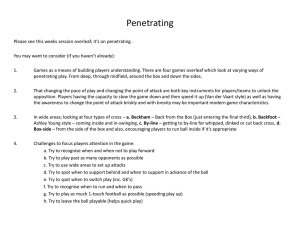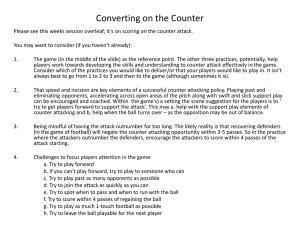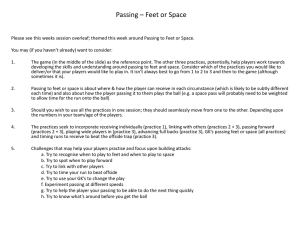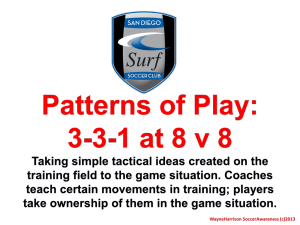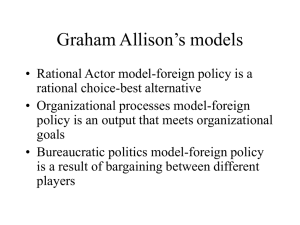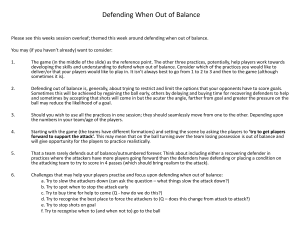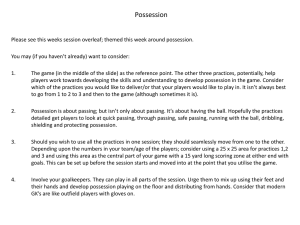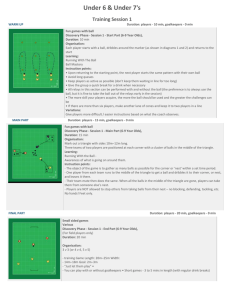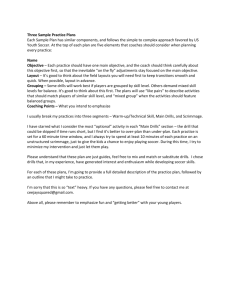Carousel – 4 Practices – Rotate Your Players Around Them (Variety)
advertisement
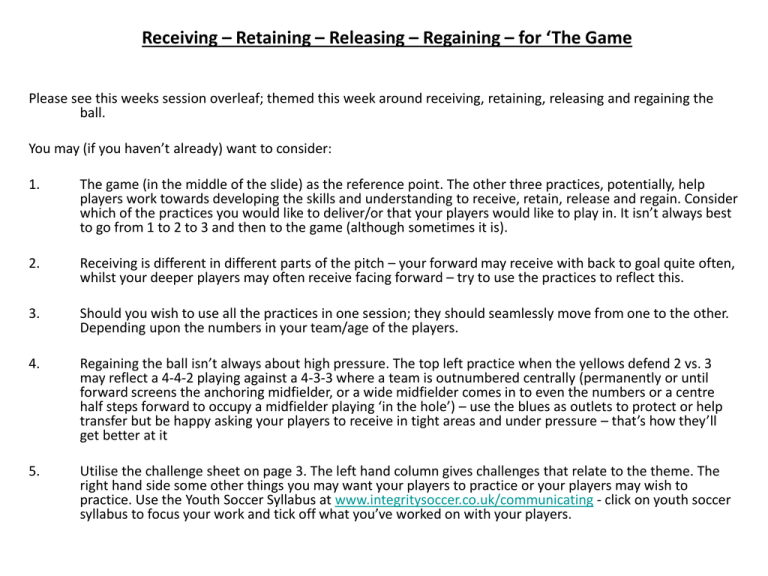
Receiving – Retaining – Releasing – Regaining – for ‘The Game Please see this weeks session overleaf; themed this week around receiving, retaining, releasing and regaining the ball. You may (if you haven’t already) want to consider: 1. The game (in the middle of the slide) as the reference point. The other three practices, potentially, help players work towards developing the skills and understanding to receive, retain, release and regain. Consider which of the practices you would like to deliver/or that your players would like to play in. It isn’t always best to go from 1 to 2 to 3 and then to the game (although sometimes it is). 2. Receiving is different in different parts of the pitch – your forward may receive with back to goal quite often, whilst your deeper players may often receive facing forward – try to use the practices to reflect this. 3. Should you wish to use all the practices in one session; they should seamlessly move from one to the other. Depending upon the numbers in your team/age of the players. 4. Regaining the ball isn’t always about high pressure. The top left practice when the yellows defend 2 vs. 3 may reflect a 4-4-2 playing against a 4-3-3 where a team is outnumbered centrally (permanently or until forward screens the anchoring midfielder, or a wide midfielder comes in to even the numbers or a centre half steps forward to occupy a midfielder playing ‘in the hole’) – use the blues as outlets to protect or help transfer but be happy asking your players to receive in tight areas and under pressure – that’s how they’ll get better at it 5. Utilise the challenge sheet on page 3. The left hand column gives challenges that relate to the theme. The right hand side some other things you may want your players to practice or your players may wish to practice. Use the Youth Soccer Syllabus at www.integritysoccer.co.uk/communicating - click on youth soccer syllabus to focus your work and tick off what you’ve worked on with your players. Receiving – Retaining – Releasing – Regaining for ‘The Game’ In The Game 1. 6 vs.5 including GK’s 2. Incorporates all elements from each of the practices – when to run/link to move forward; playing off a front player and receiving and playing through midfield. C Running or Linking Practice 1. 3 areas – end areas 10 long x 20 wide – central area 20 long and 20 wide. Yellows score by moving ball from end to end ensuring they work through central area 2. Reds – 3 x regains and then swap with 4 yellows (motive to defend well) 3. Either run bal out of end zone, pass someone else out or play into ‘c’ who can link with a player coming out (as per diagram) – when playing into other end – join in that end Receiving in Midfield Practice 1. 2. 3. 4. 5. 2 vs. 3 + 4 or 6 blues – Try to receive from one side of the circle and play to other side. If scoring – keep ball and attack the other way Yellows – can use blues to transfer – as they are outnumbered 2 vs. 3 (reflective of 2 central midfielders vs. 3 central midfielders Red’s – try to work ball around the yellows in the central area Out of possession – Yellows – try to work out when to press and when not to – try to keep possession in front of you Out of possession - Reds – try to position so that you can intercept Front Player Receiving Practice 1. 4 vs. 4 2. Half way line – 2 v 1 in each half (3 v 1 inc. GK) 3. Work ball into attacking half and try to get one deep lying player to join in to score goals 4. On re-gaining- try to counter quickly Challenges + Coaching Points to help your Players Challenges Relating to the Practices Other Challenges that may suit Individuals 1. Try to recognise when to run and when to pass 1. Try to recognise when to follow an opponent short and when to hold your position 2. Try to spot when to join the attack and when to stay in position 2. Try to identify when to mark space and when to mark players 3. Try to leave the ball playable for the next player 3a. Try to lend it to someone else and get it back (1-2’s) 3. Try to recognise when to press and when to drop 4. Try to recognise when to risk it and when to keep it 4. Try to mark ball-side 5. Try to play forward (pass, run with) 5a. Try to pass between opponents 5b. Try to bypass as many opponents as you can 5. Look for opportunities to switch play 6. Try to recognise when to support behind the ball and when to support in front of the ball 6. GK – when to push defence up 6b. GK – when to play short and when to play long 7. Try to look for passes into the forwards feet 7b. Try to link up passes from midfield 7. When to use skills and tricks to beat an opponent Notes for Coaches 1. Try to use the challenges to help the players to decide the best thing to do for the situation 2. Try to select challenges that fit the area of work 3. Try to recognise which player(s) needs a new/different challenge (recognise when to stop the whole group and when you can speak to an individual 4. Allow players to choose their own challenges (even if it doesn’t link directly to the theme (so it’s their own syllabus)

